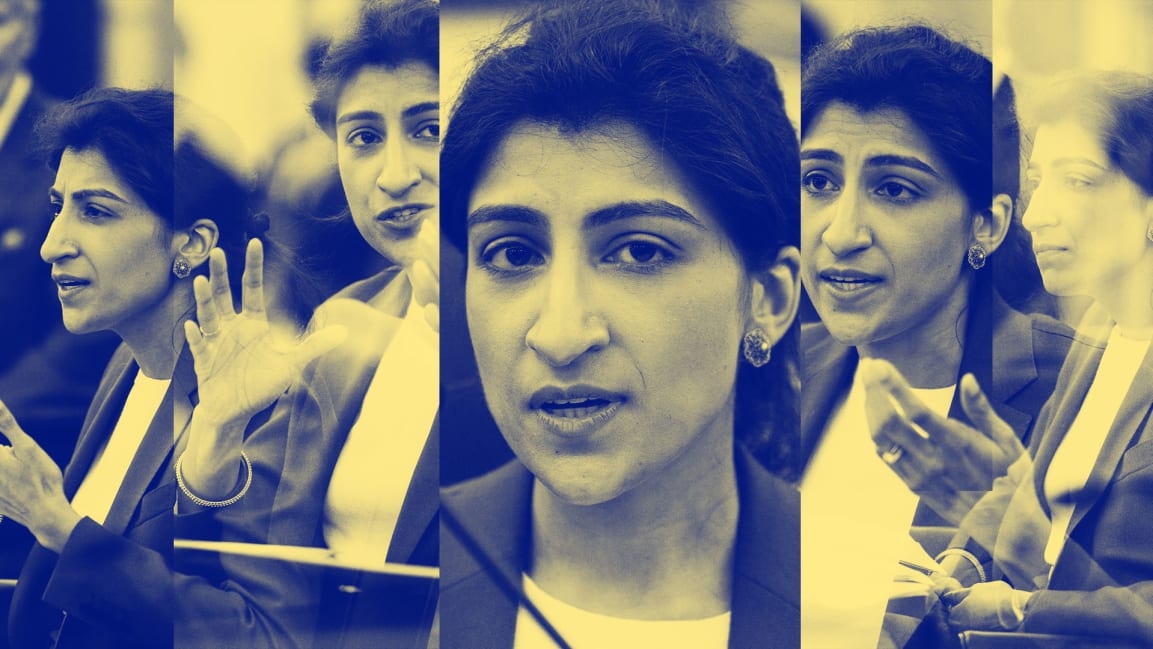Lina Khan’s first on-camera interview: 5 takeaways, from Big Tech mergers to the metaverse
Lina Khan has given her first on-camera interview since being named chair of the Federal Trade Commission. In it, the legal scholar, who has previously excoriated companies like Amazon for nimbly working around antitrust laws to undercut competitors and expand into new territory, talked about the current state of the commission. Below are five takeaways from her conversation with CNBC’s Andrew Ross Sorkin and New York Times columnist Kara Swisher.
The agency is underfunded
“We are severely under-resourced,” Khan said of the FTC. There are currently 1,100 people working for the commission, which she says is about two-thirds of what staffing was like in the 1980s. What that means is that the agency will have to make tradeoffs in terms of what cases it pursues. “We have to make very difficult choices about which billion-dollar deals we’re making sure that we’re investigating,” she said.
Khan adds that choosing cases that have a market-wide impact and ultimately deter companies from engaging in anticompetitive behavior will be key. That said, more funding would significantly help the agency do its work, she says. (A bipartisan bill from senators Amy Klobuchar and Chuck Grassley could increase money to the agency for merger filings if it passes.)
It is redefining ‘harm’
“Some of the metrics that have been used over the last decades have not really captured in full the full architecture of market power that we’re seeing and how it’s being exercised,” she says. “So for me the key question is really how do we make sure that our tools and our frameworks and the ways that we’re enforcing the law is matching the world that we’re living here.”
One example she points to is how unions used to favor mergers because they believed the downstream impacts would be a net positive for workers. Now, she says there is evidence that mergers may have more repercussions for workers. “We started to see through retrospective studies instances where mergers actually had a harmful effect,” she said. “That’s what’s contributing to that reassessment.”
Another phenomenon the agency is examining is instances in which it may not be obvious that market power is being used to raise prices. One could imagine, she says, how an inflationary environment might give cover to companies exploiting their monopoly power. “If prices are rising around them, they can either unilaterally or in a coordinated way raise prices in ways that might not be as easily detectable.”
Another example she gives is how market consolidation may have helped create the current constrained supply chain. “Capacity has been thinned out and as a result of that the system as a whole may be less resilient, so when have certain types of shocks, certain types of disruptions, be it a natural disaster or a global pandemic, we’re not able to respond as quickly and that can lead to certain kinds of price increases,” she says.
It’s not all about tech
While tech executives criticize the FTC for supposedly targeting them in antitrust complaints, “the implication in that criticism is that FTC is squarely focused on this industry at the expense of others,” Khan says. “The idea that this is somehow tech focused really misses the broader picture, which is that we’ve seen consolidation in a more systematic way across the economy and both the DOJ and the FTC are taking on this in a holistic way.” She points to cases of consolidation in healthcare, retail, and grocery as examples.
Congress may have to rewrite laws
Khan notes that while it is currently rewriting guidance around mergers, at the end of the day, the FTC is an enforcement agency. She says there a host of questions that lawmakers are currently considering, like whether it is ethical for companies that own marketplaces to also sell products in that marketplace. “Historically, there have been sectors where Congress set those rules,” she says pointing to the separation between banks and marketplaces.
Copycat products are on the FTC’s radar
“One reason why [copycat products] have raised broader concerns is that it could potentially sap innovation and investment,” she says. “If you’re an entrepreneur and you’re going to bring a product or service to market but you’re not going to be able to reap the rewards of that investment because someone is going to swoop in and appropriate it and bundle it or bolt it on, I think that can raise broader questions—whether it’s an antitrust question is looking at the specific details.”
However, she does think it will be important to untangle how this copycatting plays a role in cementing monopolies as tech moves into the metaverse economy. “We have to make sure we’re fully learning the lessons of the last two decades and applying them in these markets so we’re not allowing the incumbents to extend and protect their monopolies in ways that are just squashing rivals and engaging in unlawful conduct,” she says.
(45)



